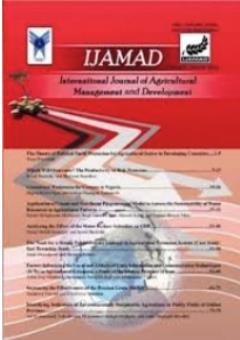The Impacts of Climate Changes on Trade Balance of Agricultural Sector of Iran
Subject Areas : Environmental policy and management
Keywords: Climate Change, Reduced Precipitation, Exchange Rate, Trade Balance, ARDL Model.,
Abstract :
The purpose of the present study was to investigate the effect of climate changes on the trade balance of Iran's agriculture sector. For this purpose, two main climatic components i.e. precipitation and temperature were used and Autoregressive Distributed Lag (ARDL) econometric model was used to estimate the model. The study results showed that the increase in temperature improves trade balance, and the reduction in precipitation leads to worsening trade balance of Iran's agriculture sector. Therefore, the effect of climate changes on Iran's agriculture trade balance was confirmed. Also, the negative and declining trend in Iran's trade balance indicates that Iran has increased food imports in order to adapt to climate change shocks and maintain its food security. Given the international sanctions imposed on the country and the shortage of foreign exchange reserves, reliance on trade to adapt to climate changes shocks is not appropriate. Hence, in order to maintain the country's food security, it is recommended that, in addition to trade policies, policy measures should be taken to increase the agriculture sector's resilience to climate changes, the measures such as the use of water-saving technologies, eugenics research for the production of drought tolerant plant species and climate smart agriculture.

